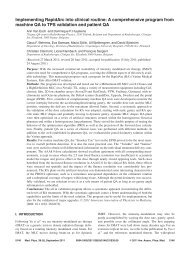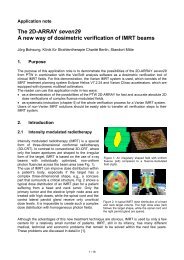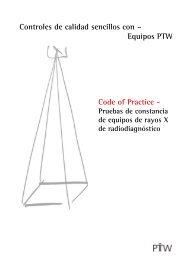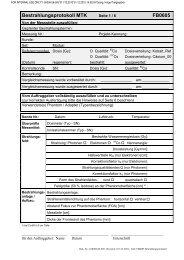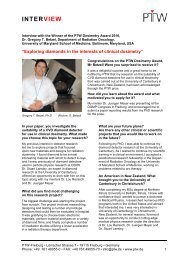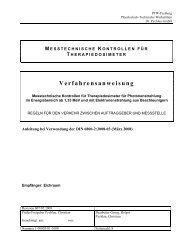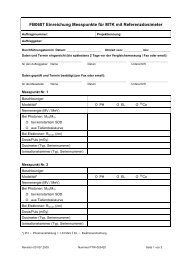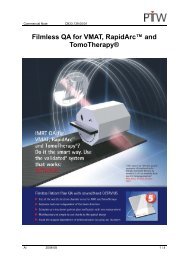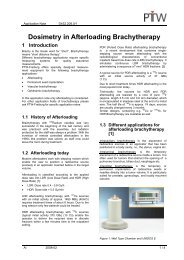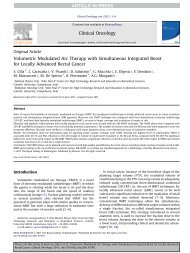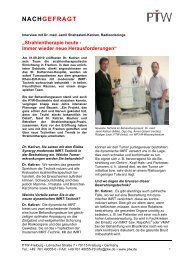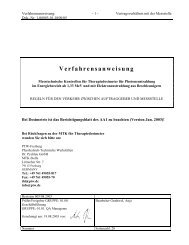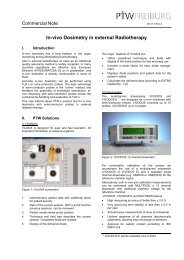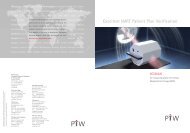Create successful ePaper yourself
Turn your PDF publications into a flip-book with our unique Google optimized e-Paper software.
<strong>INTERVIEW</strong><br />
Interview with the Winner of the <strong>PTW</strong> Dosimetry Award 2011,<br />
Mr. Hui Khee Looe, M.Sc., Medical Radiation Physics,<br />
Carl-von-Ossietzky University / Pius-Hospital Oldenburg, Germany<br />
“Detector research takes us one step forward<br />
towards improving accuracy in radiation therapy”<br />
First of all, congratulations on the<br />
<strong>PTW</strong> Dosimetry Award, Mr Looe!<br />
In your award-winning paper, you present<br />
the results of a comprehensive study which<br />
you conducted to determine the effective<br />
point of measurement of various detectors.<br />
Can you briefly describe how you came to<br />
undertake this particular study and what<br />
you and your co-authors discovered?<br />
What is the next step in this study?<br />
We started this study as a contribution to a<br />
German DIN standard, in which the concept<br />
of the effective point of measurement is treated.<br />
The general result of this study is the invariance,<br />
for a given detector, of the shift of the effective<br />
point of measurement in the presence of an<br />
arbitrary dose gradient. This finding is<br />
complemented with a theoretical explanation<br />
derived from the fact that the displacement<br />
effect is proportional to the gradient of the<br />
fluence of the directly ionizing particles in the<br />
spatial region of the surrounding medium<br />
occupied by the detector.<br />
Our results have also revealed the shortcomings<br />
of the "water equivalent depth" formula for flat<br />
ionization chambers given in the DIN standard.<br />
Besides atomic interactions of the primary beam<br />
in all layers of the entrance window, other<br />
perturbation effects are playing a role in shifting<br />
the effective point of measurement. For the<br />
cylindrical chambers, the ratio of the shift of the<br />
effective point of measurement to the radius<br />
was observed to increase with the radius itself.<br />
All measurements in this study were performed<br />
in water equivalent material. There now remains<br />
the interesting question whether the shift of the<br />
effective point of measurement would remain<br />
unchanged if the detector is embedded in a<br />
medium with a density different to that of water.<br />
Our next step is therefore to conduct measurements<br />
in other mediums and extend the energy<br />
range of the test radiations to lower energies,<br />
such as those commonly used in brachytherapy.<br />
Hui Khee Looe, M.Sc. (Picture: H. K. Looe)<br />
Which applications and aspects of<br />
clinical dosimetry are of special interest<br />
to you? What research projects are you<br />
currently involved with?<br />
One of my research interests is the<br />
understanding of the implications of radiation<br />
transport effects and detector dimensions<br />
on the accuracy in clinical radiation dosimetry.<br />
Our group works on the characterization of<br />
the response functions for single detectors.<br />
Appropriate methods for correction are derived<br />
based on these response functions to allow<br />
for accurate characterization of beam profiles,<br />
especially in small-field dosimetry.<br />
State-of-the-art techniques in radiation therapy<br />
often involve the use of highly modulated dose<br />
distribution with steep gradients. The obtained<br />
knowledge for single detectors is transferred<br />
to two-dimensional detector arrays commonly<br />
used for dosimetric plan verification.<br />
We propose solutions based on physical and<br />
mathematical models that can be used to<br />
increase the resolution of these detector arrays<br />
and to facilitate the accurate characterization<br />
of complex dose distributions.<br />
<strong>PTW</strong>-Freiburg • Lörracher Strasse 7 • 79115 Freiburg • Germany<br />
Phone: +49 761 49055-0 • FAX: +49 761 49055-70 • info@ptw.de • www.ptw.de 1
<strong>INTERVIEW</strong><br />
What do you like about your daily work<br />
as a medical physicist?<br />
I like the wide range of responsibilities of a<br />
medical physicist. Successful radiation therapy<br />
is the result of multidisciplinary input, with the<br />
medical physicists playing a significant role.<br />
To be part of a competent team in the Clinic of<br />
Radiation Therapy at Pius Hospital Oldenburg<br />
is a very fulfilling experience for me.<br />
I also appreciate the balance between the<br />
clinical routine and my research work which<br />
I think complement each other well. Clinical<br />
experience exposes me to the important<br />
aspects of dosimetry in need of improvement<br />
which translate into research activities.<br />
The outcome of my research will contribute to<br />
improve the accuracy and reliability of clinical<br />
practices. I am grateful to our medical director<br />
Dipl. Phys. Dr. med. Kay C. Willborn for his<br />
support towards my research and my mentors<br />
Prof. Dr. Björn Poppe, Dr. Antje Rühmann and<br />
Prof. em. Dr. Dietrich Harder for their guidance<br />
and encouragement.<br />
What prompted you to specialize in<br />
medical physics quite early on in<br />
your career?<br />
While I was studying in Oldenburg, I had the<br />
chance to work in the Clinic of Radiation<br />
Therapy at Pius Hospital. My responsibilities<br />
were to perform morning quality assurance of<br />
the linear accelerators and to provide assistance<br />
to the medical physicists in their daily clinical<br />
work. I was lucky to be surrounded by very<br />
competent medical physicists, from whom<br />
I have learned a lot. At that time, I became<br />
attracted by medical physics and decided to<br />
specialize in this field during my studies.<br />
After I had obtained my master’s degree,<br />
I was given the opportunity to pursue my<br />
doctorate degree at the Carl-von-Ossietzky<br />
University and at the same time to perform<br />
my clinical training at Pius Hospital. This was<br />
how my career as a medical physicist began.<br />
In 2000, you left Malaysia to study<br />
physics at Oldenburg University.<br />
Why did you come to Germany and<br />
Oldenburg in particular?<br />
To be honest, Germany was not my first choice<br />
for my undergraduate studies. Coming to<br />
Germany, however, especially to Oldenburg,<br />
is a decision I will never regret. When I was<br />
still at college in Malaysia, I came across<br />
a newspaper article about the opportunities<br />
of further education offered in Germany.<br />
I gave it a try and sent my application to<br />
numerous universities in Germany offering<br />
physics degree programs, and the first reply<br />
I received was from the university in Oldenburg.<br />
Three months later, I landed in Frankfurt.<br />
What did you miss most when you<br />
came to Germany?<br />
The only German words I knew when I arrived in<br />
Germany were “Guten Tag” and “Danke” which<br />
I learned from a travel book. It was a tough time<br />
at the beginning and I missed my family very<br />
much. I am thankful to my parents and my wife<br />
for their unrelenting support and love, without<br />
which I would not have achieved this far.<br />
Mr. Looe, thank you for the interview and<br />
much success with your future projects.<br />
Personal<br />
Hui Khee Looe,<br />
originally from Malaysia,<br />
came to Germany in<br />
2000 to study physics<br />
at Carl-von-Ossietzky<br />
University in Oldenburg.<br />
After receiving his B.E.<br />
in Engineering Physics,<br />
he continued to study for his master’s degree<br />
which he completed in 2006.<br />
As a research assistant, Hui Khee Looe<br />
is a member of the medical radiation physics<br />
research team headed by Professor<br />
Björn Poppe at Oldenburg University and<br />
works as a medical physicist at Pius Hospital<br />
in Oldenburg. He is currently pursuing his<br />
PhD studies on deconvolutions and resolution<br />
corrections in clinical radiation dosimetry<br />
aimed to improve the accuracy of radiation<br />
therapy.<br />
Contact:<br />
Hui Khee Looe, M.Sc.,<br />
Medical Radiation Physics,<br />
Carl-von-Ossietzky University /<br />
Pius Hospital Oldenburg, Germany,<br />
hui.k.looe@uni-oldenburg.de<br />
Media Contact at <strong>PTW</strong><br />
Ute Wüstefeld<br />
Marketing Manager<br />
<strong>PTW</strong>-Freiburg<br />
+49 (0) 761 49055-591<br />
ute.wuestefeld@ptw.de<br />
<strong>PTW</strong>-Freiburg • Lörracher Strasse 7 • 79115 Freiburg • Germany<br />
Phone: +49 761 49055-0 • FAX: +49 761 49055-70 • info@ptw.de • www.ptw.de 2



